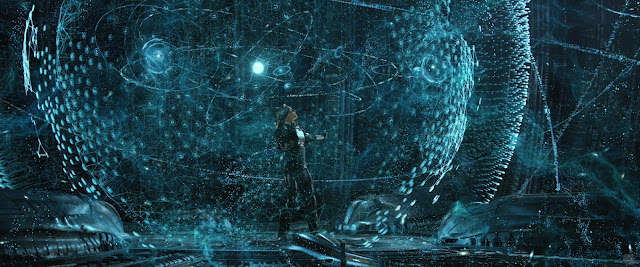
1. Is the universe a 2D hologram?
The US Department of Energy (USDE) launched an experiment to find this out earlier this year using its "Holometer". Researchers said that characters on a TV programme would not know their seemingly 3 Dimensional ( 3D ) worlds existed only on a 2D screen.
In the same way, they said we technically could be living in a 2D universe with just an illusion of a 3D space. To find out, scientists said that if cooled to absolute zero, matter continues to emit quantum waves. If 2D packages (like pixels on a TV screen) follow the same theory, they will continue to vibrate. The Holometer is the most sensitive device ever, created to measure the "quantum jitter" of space.
Craig Hogan, director of the laboratory, said: "We want to find out whether space-time is a quantum system, just like matter is. If we see something, it will completely change ideas about space we've used for thousands of years."
2. Universe is a bubble in a 'frothy sea of universes'
Scientists at the Perimeter Institute for Theoretical Physics said the universe is just one bubble amid a "frothy sea" of other universes. They say the theory of multiple universes comes from the idea of there being a vacuum in the beginning of time, with energy simmering like boiling water – the energy then started to evaporate and form bubbles."Maybe the bubbles were rare and far apart; maybe they were packed close as foam," they said in a statement."But here's the thing: each of these bubbles was a universe. In this picture, our universe is one bubble in a frothy sea of bubble universes. That's the multiverse hypothesis in a bubbly nutshell."

3. Universe is a 'mirage of a black hole' in 4D realm
This theory was also put forward by scientists at the Perimeter Institute. Here, they say the universe emerged from a collapsed star in a four-dimensional universe. Challenging the Big Bang Theory, which they say is the idea of singularity, the scientists say our perception of the universe is too rudimentary to comprehend a 4D universe.
They say our universe came about when a star in another 4D universe collapsed into a black hole, and that the universe was never inside the singularity, but is instead a feature of the imploded wreck.
Researchers concede, however, that they do not know what a 4D universe looks like or how it came to be.
4. We are living in a parallel universe where time runs backwards
Published in the journal Physical Review Letters, a group of scientists challenged the idea of the arrow of time running forward, saying there are two worlds, one where time moves forward and the other backwards. Looking at a computer model of particles under the influence of gravity, they found that no matter what size or amount, all would eventually evolve into a "low-complexity state".
From this state, particles expand outwards in both temporal directions, creating opposite arrows of time – one moving forward and the other backwards. "Along each of the two temporal paths, gravity then pulls the particles into larger, more ordered and complex structures—the model's equivalent of galaxy clusters, stars and planetary systems," a report in Scientific American said.
"From there, the standard thermodynamic passage of time can manifest and unfold on each of the two divergent paths. In other words, the model has one past but two futures." However, researchers also said intelligent beings would believe their arrow of time was moving forward.
5. Parallel universes exist and interact with one another
Scientists at the Griffith University in Queensland, Australia said parallel worlds exist and interact with one another – and that this helps to explain the "weird phenomena" of the universe. They said our universe is just one of a "gigantic number" of worlds, with some very similar to our own and others very different.
Their theory, Many Interacting Worlds, says that nearby worlds influence one another by a force of repulsion – which is where unexplained quantum phenomenon comes from. Co-author Michael Hall said: "The beauty of our approach is that if there is just one world our theory reduces to Newtonian mechanics, while if there are a gigantic number of worlds it reproduces quantum mechanics.
"In between it predicts something new that is neither Newton's theory nor quantum theory. We also believe that, in providing a new mental picture of quantum effects, it will be useful in planning experiments to test and exploit quantum phenomena."
